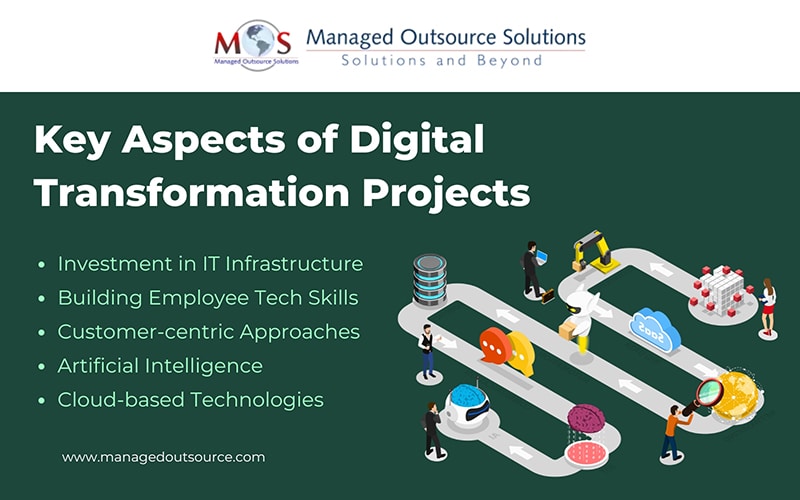Digital transformation has come a long way since it born in the middle of the last century. With technological advancements, digitization has disrupted the way we work and live. There is no way out – prioritizing digital initiatives has become a necessity for businesses to succeed in an increasingly competitive world. By providing access to cutting-edge tools and expertise, outsourced solutions play an important role in helping companies speed up adoption of innovative technologies and processes. Emerging technologies such as artificial intelligence, machine learning, cloud computing, and automation have made digitization of business operations even more important.
Digitization – 5 Strategies to Stay Ahead of the Game
Whether you’re a small startup or a well-established business, embracing digital transformation can reduce overheads, optimize workflow and grow revenue.
In fact, digital transformation can positively impact every area of a business by:
- Improving customer experience
- Enhancing market reach
- Improving supply chain efficiency
- Promoting focused marketing campaigns
- Boosting employee productivity and job satisfaction
With the pace of digital transformation speeding up, you need to implement the right strategies to integrate new processes and technologies into your workflow.
Here are 5 key aspects of digital transformation projects:
Investment in IT, Automate
Customers expect digital, mobile and cloud-based experiences, and your remote team need cloud-based tools for collaboration. If you are still struggling with manual processes, it’s time to switch to automated solutions. Automating repetitive manual approval process will help to streamline the process and increase productivity. Implementing data conversion will enable data integration and analysis, upgrading legacy IT systems, and visualization across different sources. Statista estimates that spending on digital transformation will reach a staggering 3.9 trillion U.S. dollars by 2027.
Building Employee Tech Skills
Develop your team’s technology-related skills. To embrace evolving technologies, you need to have the right set of people who are willing to adapt to innovative solutions processes and solutions. Implement training to upgrade your team’s tech skills. Hire talent with the skill set and experience to implement digital transformation initiatives. Offer hybrid work and other flexible approaches can attract Gen Z and millennial IT workers seeking work-life balance.
Customer-centric Approaches
Focus on customer-centric digital transformation. This involves applying a human-centered approach to understand customer needs, come up with innovative solutions, and test them iteratively. Map out the entire customer journey to identify pain points and opportunities for improvement, and deliver a seamless experience. Leverage customer data to create personalized and convenient interactions and communications with them. Establish mechanisms to gather customer feedback regularly and adapt to evolving customer preferences.
Artificial Intelligence
Achieving operational efficiency is challenging but essential for long-term business success. With innovations such as machine learning, deep learning, natural language processing (NLP), and predictive analytics, AI simplifies this challenge. Artificial Intelligence automates repetitive processes, reduces human error and saves time. Utilizing chatbots transform customer support capacity and customer experiences. AI-driven data analytics tools can collect and analyze data from multiple sources to provide deeper insights, allowing you to make well-informed decisions.
Cloud-based Technologies
The cloud is one of the first logical first steps towards digital transformation. It offers a secure platform that makes it easy for your business to update services as business and customer demands change. Migrating important applications to a secure cloud environment can promote secure and efficient data sharing, better customer service, and faster time to market. In short, embracing the cloud can help you improve the agility and scalability of your business.
IKEA’s Digital Transformation Journey: A Definitive Success Story
Looking into real-world examples, IKEA’s journey is one of the most trending digital transformation stories. In Thomas Stackpole’s write-up in the Harvard Business Review describes how complete modernization and reengineering of all IKEA’s tech landscape revamped customer interactions both digitally and, in the store, fostering seamless, consistent customer experience. Data insights modernized inventory management, logistics, fulfilment, and supply chain overall, which led to new ways of working and operating. Barbara Martin Coppola, who was hired to lead the digital transformation initiative, said that they were also “embedding new skills and people who bring new agility”.
Get the Right Support
Digital transformation is a dynamic process. To keep up with the ever-evolving landscape, companies need to stay current with the latest trends in digital transformation. Outsourcing is a practical way to leverage the right support. Leading BPO companies are utilizing the latest systems, platforms, and tools to improve productivity and performance. Business process outsourcing services can help you optimize data entry, data conversion, document processing and many other processes, which can go a long way in supporting your journey towards sustainable and stable digital transformation.
Boost your operational efficiency with our top-notch business process outsourcing services!





